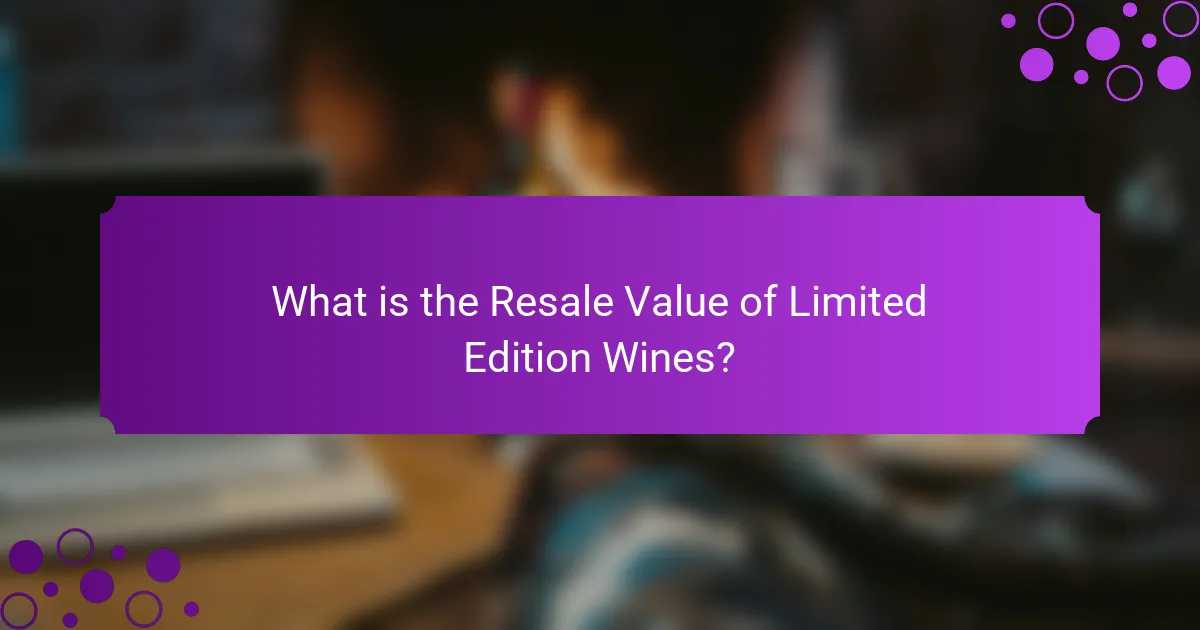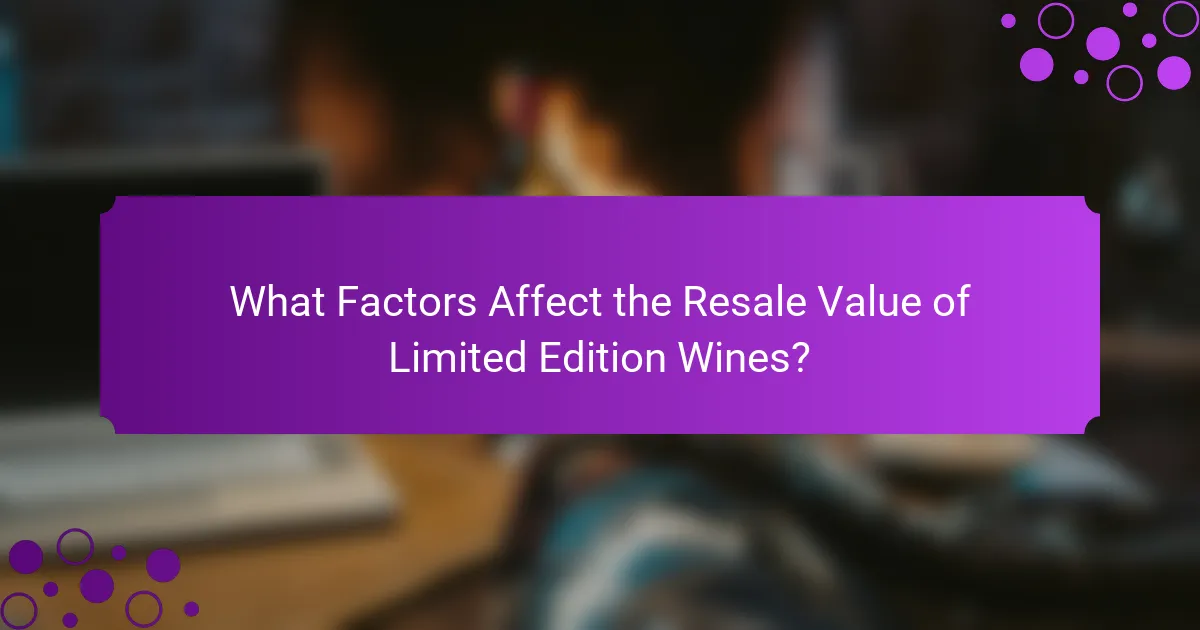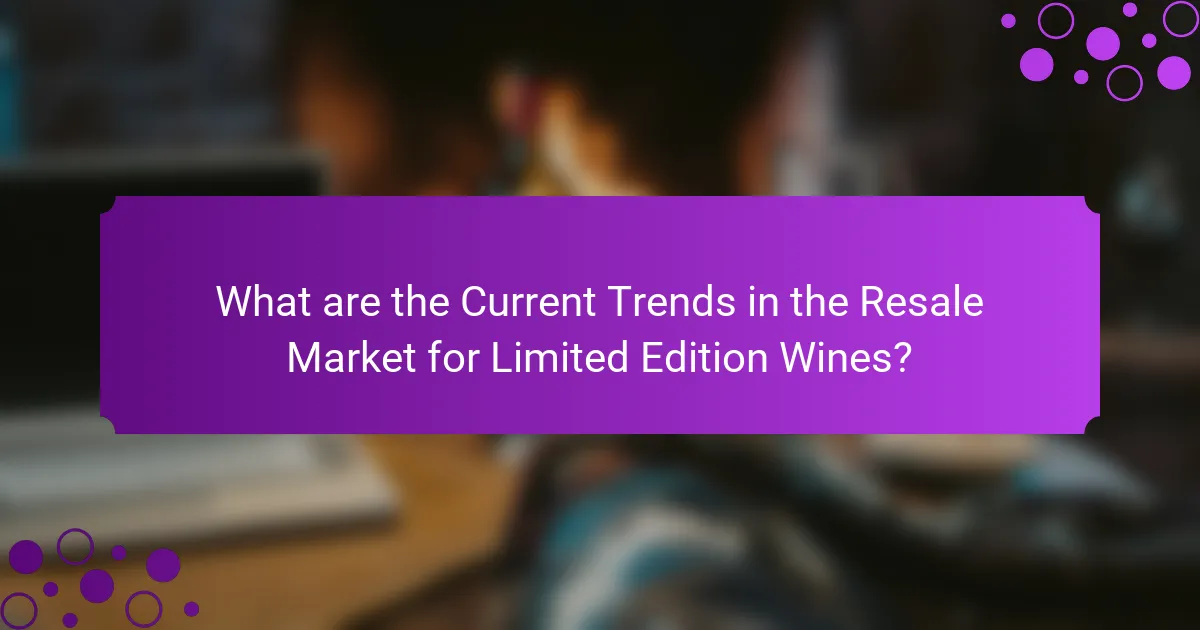
What is the Resale Value of Limited Edition Wines?
The resale value of limited edition wines can vary significantly. Factors influencing this value include brand reputation, vintage quality, and market demand. Limited edition wines often appreciate due to their rarity and exclusivity. For instance, wines from renowned producers can sell for several times their original price. Historical data indicates that certain limited editions have increased in value by over 200% within a few years. Auction results show that some bottles fetch prices exceeding $10,000. Overall, the resale value is influenced by both intrinsic quality and external market conditions.
How is the resale value determined for limited edition wines?
The resale value of limited edition wines is determined by several key factors. Rarity plays a significant role; wines that are produced in smaller quantities tend to have higher resale values. The reputation of the winery also influences value; prestigious wineries often command higher prices. Vintage quality is crucial; exceptional years can lead to increased demand and higher prices. Market demand affects resale value; wines that are sought after will sell for more. Condition and storage history impact value; well-preserved bottles fetch higher prices. Provenance, or the history of ownership, can enhance value, especially for collectible wines. Lastly, economic factors, such as market trends and consumer preferences, influence resale prices. These elements collectively shape the resale market for limited edition wines.
What factors influence the initial pricing of limited edition wines?
The initial pricing of limited edition wines is influenced by several key factors. These factors include the winery’s reputation, vintage quality, and rarity of the wine. A well-established winery typically commands higher prices due to brand trust. Vintage quality affects pricing based on climate conditions during the growing season. Rarity increases demand, leading to higher prices for limited releases. Packaging and presentation also play a role in perceived value. Additionally, market trends and consumer preferences can impact initial pricing. Economic factors, such as inflation and disposable income, further influence pricing strategies.
How do market trends affect the resale value?
Market trends significantly influence the resale value of limited edition wines. When demand for certain wine types increases, resale prices typically rise. Conversely, if a trend shifts away from a specific wine, its resale value may decline. Market trends can be driven by factors such as consumer preferences, economic conditions, and the popularity of wine regions. For example, a surge in interest for organic wines may enhance the value of limited editions in that category. Historical data shows that wines from trending regions often appreciate more rapidly. Additionally, limited supply due to market trends can create scarcity, further boosting resale prices.
Why is resale value important for wine collectors?
Resale value is important for wine collectors because it reflects the potential financial return on their investments. High resale value indicates that a wine has appreciated over time, making it a desirable asset. Collectors often purchase limited edition wines with the expectation that their value will increase. This expectation is based on factors such as rarity, quality, and market demand. For example, wines from renowned vineyards or vintages often fetch higher prices at auction. Additionally, strong resale value can help collectors make informed purchasing decisions. It allows them to assess the risk of their investments in the wine market. Therefore, understanding resale value is crucial for maximizing profits and making strategic collection choices.
What role does rarity play in the resale value of limited edition wines?
Rarity significantly enhances the resale value of limited edition wines. Limited production creates exclusivity, driving demand among collectors and enthusiasts. As fewer bottles are available, the perceived value increases. This demand often leads to higher prices in secondary markets. Historical data shows that rare wines can appreciate substantially over time. For example, a limited edition bottle may sell for several times its original retail price at auction. The scarcity of these wines is a key factor influencing buyer behavior and investment potential.
How does provenance impact the perceived value of a wine?
Provenance significantly impacts the perceived value of a wine. It refers to the wine’s origin, history, and ownership. Wines with a well-documented provenance are often more sought after. This is because provenance assures buyers of quality and authenticity. For instance, wines from renowned vineyards or specific vintages can command higher prices. Historical significance also plays a role; wines linked to famous events or collectors are valued more. Provenance can enhance a wine’s story, making it more appealing to collectors. According to a 2020 report by Liv-ex, wines with strong provenance can sell for up to 30% more than similar wines without it. Thus, provenance is a key factor in determining a wine’s market value.

What Factors Affect the Resale Value of Limited Edition Wines?
The resale value of limited edition wines is influenced by several key factors. Rarity significantly affects value; wines produced in small quantities tend to be more sought after. Brand reputation also plays a crucial role; well-known wineries often command higher prices. Vintage quality impacts resale value; exceptional years yield wines that appreciate over time. Provenance is important; a documented history of storage and ownership can enhance desirability. Market demand fluctuates; trends in consumer preferences can drive prices up or down. Lastly, condition matters; wines stored properly maintain their value better than those exposed to unfavorable conditions. These factors collectively determine the resale value of limited edition wines.
How do vintage and age influence resale value?
Vintage and age significantly influence the resale value of limited edition wines. Older vintages often command higher prices due to their rarity and perceived quality. For instance, wines from exceptional years, like 2000 or 2005 Bordeaux, can sell for several times their original retail price. Age also affects taste and complexity, making older wines more desirable among collectors. The market often sees increased demand for wines that have aged gracefully, as they offer unique flavors that younger wines may lack. Collectors and investors prioritize these factors, leading to higher resale values for sought-after vintages.
What is the significance of vintage in wine valuation?
The significance of vintage in wine valuation is paramount. Vintage refers to the year the grapes were harvested. It influences wine quality, taste, and market demand. Certain years yield exceptional weather conditions, resulting in superior grapes. For example, the 1982 Bordeaux vintage is renowned for its outstanding quality. High-quality vintages often command higher prices in the market. Collectors and investors prioritize these vintages for their potential return on investment. Additionally, vintage charts and ratings help assess wine quality over time. Thus, the vintage plays a crucial role in determining a wine’s resale value.
How does aging affect a wine’s market demand?
Aging positively affects a wine’s market demand. As wine ages, its flavor profile and complexity often improve. This enhancement can lead to increased desirability among collectors and enthusiasts. Aged wines are frequently perceived as more valuable due to their rarity and the aging process. Historical data shows that certain vintage wines can appreciate significantly over time. For instance, wines from renowned regions like Bordeaux and Burgundy often see higher demand as they age. Additionally, the limited availability of older vintages can drive up market prices. Thus, aging is a crucial factor in determining a wine’s market demand.
What role do brand reputation and ratings play?
Brand reputation and ratings significantly influence consumer trust and purchasing decisions. A strong brand reputation can enhance perceived value and desirability of limited edition wines. Positive ratings often correlate with higher resale prices in the market. According to a study by Wine Market Council, consumers are willing to pay 20% more for wines from reputable brands. This indicates that brand perception directly affects resale value. Additionally, brands with high ratings tend to have a loyal customer base, ensuring consistent demand. In contrast, poor reputation can lead to decreased interest and lower resale values. Thus, brand reputation and ratings are crucial in determining the financial success of limited edition wines.
How do wine ratings from critics influence resale value?
Wine ratings from critics significantly influence resale value. Higher ratings typically lead to increased demand among collectors and investors. Wines rated 90 points or above often see substantial price appreciation. For example, a wine rated 95 points can sell for double the price of a 90-point wine. Critics’ reviews serve as a trusted guide for buyers. This trust translates into higher resale values for highly rated wines. Additionally, wines from prestigious critics or publications can command even higher prices. The correlation between ratings and resale prices is evident in auction results and sales data.
What impact does a winery’s reputation have on limited edition wines?
A winery’s reputation significantly influences the market value of limited edition wines. High-quality reputations often lead to increased demand for these exclusive products. Consumers perceive wines from reputable wineries as more desirable and trustworthy. This perception can result in higher resale prices in secondary markets. For instance, wines from renowned wineries like Château Lafite Rothschild often appreciate significantly over time. Conversely, wines from lesser-known wineries may struggle to achieve similar resale values. The reputation also affects the initial pricing strategy for limited editions. Wineries with strong reputations can command premium prices. This correlation between reputation and market value is well-documented in wine investment literature.

What are the Current Trends in the Resale Market for Limited Edition Wines?
Current trends in the resale market for limited edition wines include increased demand and higher prices. Collectors are actively seeking rare bottles, driving up their resale value. Online platforms have emerged as popular venues for buying and selling these wines. Auctions have seen a surge in participation, with record sales reported. The trend towards wine investment is growing, as consumers view it as a stable asset. Limited releases from renowned wineries often sell out quickly, creating scarcity. Furthermore, social media influences purchasing decisions, as enthusiasts share their collections. Overall, the resale market is thriving, reflecting a robust interest in limited edition wines.
How has the demand for limited edition wines changed recently?
The demand for limited edition wines has significantly increased recently. This surge is attributed to a growing interest among consumers in unique and exclusive products. According to a report by the IWSR, the global wine market has seen a 25% rise in the purchase of limited edition wines over the past two years. Additionally, online platforms have made these wines more accessible, further driving demand. The trend reflects a broader consumer shift towards premiumization in the beverage sector. Collectors and investors are also contributing to this demand, viewing limited editions as valuable assets.
What demographic factors are influencing current trends?
Demographic factors influencing current trends in limited edition wines include age, income, and education level. Younger consumers, particularly millennials, are increasingly interested in unique wine experiences. Higher income brackets tend to invest more in limited edition wines, driving demand. Additionally, consumers with higher education levels often seek out premium products, valuing quality and exclusivity. These trends are supported by data showing that millennials account for a significant portion of wine purchases, with 42% of them expressing interest in premium wines. Furthermore, a report by the IWSR indicates that the luxury wine market is growing, driven by affluent consumers seeking investment opportunities.
How are online platforms reshaping the resale market?
Online platforms are significantly reshaping the resale market by providing accessibility and convenience for buyers and sellers. These platforms enable users to list and purchase items easily, which increases market participation. For example, platforms like eBay and Poshmark allow individuals to sell limited edition wines directly to consumers. This direct-to-consumer model bypasses traditional retail channels, enhancing price transparency. Additionally, online platforms often feature user reviews and ratings, which build trust and inform purchasing decisions. According to a report by Statista, the global online resale market is expected to reach $64 billion by 2024. This growth indicates a shift towards digital transactions in the resale market. Overall, online platforms are democratizing access to resale goods, including limited edition wines.
What are the future predictions for the resale value of limited edition wines?
Future predictions for the resale value of limited edition wines are generally optimistic. Experts anticipate a steady increase in value due to growing interest among collectors. Limited edition wines often appreciate in value over time, especially from renowned producers. Historical trends show that certain vintages have doubled or tripled in value within a decade. Demand for unique and rare wines continues to rise globally. Factors such as scarcity and brand reputation significantly influence resale prices. Additionally, market data indicates that wine auctions have seen higher bids for limited editions in recent years. Overall, the combination of increasing demand and limited supply suggests a positive outlook for resale values.
How might economic factors impact wine resale values in the coming years?
Economic factors will likely influence wine resale values significantly in the coming years. Changes in disposable income can affect consumer purchasing power for luxury items like wine. Economic downturns often lead to decreased demand, lowering resale prices. Conversely, economic growth can increase demand, potentially raising prices. Inflation may also impact wine costs, affecting resale values. Supply chain issues can create scarcity, enhancing value. Historical trends show that economic conditions have historically correlated with wine price fluctuations. For instance, during the 2008 financial crisis, wine prices dropped due to reduced consumer spending.
What emerging trends should collectors watch for?
Collectors should watch for the increasing popularity of sustainable and organic wines. This trend reflects a growing consumer preference for environmentally friendly products. Limited edition wines that emphasize sustainability often see higher resale values. Additionally, digital platforms for wine trading are emerging. These platforms enable collectors to buy and sell wines more efficiently. The rise of wine investment funds is also noteworthy. These funds allow investors to diversify their portfolios with fine wines. Lastly, the influence of social media on wine trends is significant. Collectors should monitor online communities for emerging preferences and valuations.
What tips can collectors follow to maximize resale value?
To maximize resale value, collectors should maintain the wine’s original packaging and condition. Proper storage in a climate-controlled environment preserves quality. Documenting provenance enhances credibility and value. Collectors should also research market trends and demand for specific vintages. Engaging with reputable auction houses can connect sellers with serious buyers. Timing the sale to coincide with peak market interest can yield better prices. Lastly, networking with other collectors can provide insights and opportunities for profitable sales.
How can proper storage enhance the value of limited edition wines?
Proper storage enhances the value of limited edition wines by preserving their quality and integrity. Optimal storage conditions include consistent temperature, humidity control, and protection from light. Wines stored at temperatures between 45-65°F maintain their flavor profile and aging potential. High humidity levels, ideally around 70%, prevent corks from drying out and letting in air. Exposure to UV light can degrade wine, so dark storage spaces are essential. Properly stored wines are more likely to appreciate in value over time. According to a study by Liv-ex, wines with optimal storage conditions can see value increases of up to 20% over five years.
What strategies should collectors use when selling their wines?
Collectors should use market research to determine the optimal selling price for their wines. They should analyze recent sales of similar wines to gauge demand. Timing is crucial; selling during peak seasons can maximize profits. Networking with wine experts and potential buyers can create opportunities. Utilizing online platforms can broaden the audience reach. Proper storage and documentation of provenance enhance value. Engaging in auctions can attract serious collectors. Finally, being transparent about the wine’s condition builds trust with buyers.
The primary entity of this article is the resale value of limited edition wines. The article evaluates key factors that influence this value, including rarity, brand reputation, vintage quality, and market demand. It discusses how these elements determine both initial pricing and resale potential, highlighting the importance of provenance and storage conditions. Additionally, current trends in the resale market, demographic influences, and future predictions are explored, providing insights for collectors on maximizing their investments in limited edition wines.